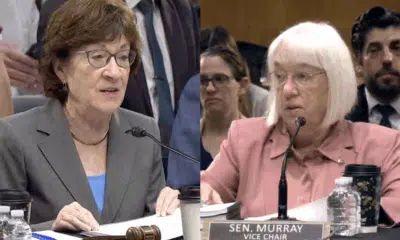News from the South - North Carolina News Feed
At least 3 of 43 fatalities in Buncombe were unhoused people • Asheville Watchdog
Asheville Watchdog is bringing you the stories behind the staggering loss of life from Helene, the children, parents, grandparents, multiple generations of a single family, all gone in one of the worst natural disasters to hit the mountains of western North Carolina. This is the seventh installment.
Buncombe County’s homeless advocates feared the worst: Helene would be deadly for the dozens of unhoused people living along the banks of rivers and streams that turned into raging floodwaters.
“We thought that the death toll just in this population was going to be up in the 20s, 30s, just because of how many people camp on the rivers,” said Alanna Kinsella, homeless services director at Homeward Bound.
Read previous installments of The Lives We Lost.
Asheville Watchdog has identified three unhoused people of the 43 who perished in Buncombe from the Sept. 27 tropical storm: Jody Henderson, an Air Force veteran described by his sister as extremely loving, Calvin “Michael” McMahan, who liked to travel and preach to people he met, and Lisa Plemmons, a cook at an Asheville nursing home who was living in her car and had been featured in a previous installment of The Lives We Lost.
About five unhoused people remain unaccounted for, Kinsella said.
“Did they leave town before? Do we have their legal name? It’s really hard to know,” she said. “It could only be one or two people that are really actually missing.”
The toll on Asheville’s homeless community turned out to be lower than feared. The Asheville-Buncombe Homeless Coalition called a Code Purple beginning the morning of Sept. 26, opening shelter space for anyone who needed it and providing free bus transportation.
Teams that included community paramedics and outreach workers visited homeless encampments to warn people near water and urge them to seek shelter. Advocates were also able to spread the word about Code Purple early because of the persistent rains ahead of the storm.
At AHOPE, a day shelter run by Homeward Bound, “so many people were coming in here at that time because people needed to get dry, they needed to get supplies,” Kinsella said. “We were really able to disseminate that information really quickly.”
Many went to shelters, “and a lot of our campers really moved into the core of town,” Kinsella said.
In the weeks after the storm, advocates have been attempting to account for everyone. Asheville’s 2024 Point-In-Time count identified 739 people without housing, most in emergency shelters or transitional housing, but 219 were camping, sleeping in cars or on the street.
The task has been difficult because some homeless people were known only by aliases or street names.
“It really took an entire community of us to come together and say, ‘Okay, I know that person’s legal name,’ or ‘I only know them by this,’“ Kinsella said. “It was a lot of really having to piece things together.
“It may be a while before we know the full scope of who all from our community, of people experiencing homelessness, have been lost.”
Here are two of their stories.
Jody Henderson
Jody Henderson’s life never was easy, but he “was one of the most loving people you would ever meet,” said his sister, Kathy Henderson Cook.
Her younger brother struggled with bipolar disorder and was often homeless and unable to work. Henderson had a high IQ and was good looking, she said, but the disease kept him hamstrung for most of his adult life.
“He had so much going for him, but he just couldn’t put that grasp on things and just stay with it,” Cook said. “He would float off, and then he would just get kind of loopy.”
Henderson, 63, died Sept. 27, swept away by Helene’s floodwaters, according to his death certificate.
He had been staying at the Veterans Restoration Quarters on Tunnel Road in East Asheville, but Cook said he’d spent a couple of weeks at the VA hospital for mental health treatment.
On the day before Helene, Henderson was on a “weekend pass” from the VRQ and rented a cabin along the Swannanoa River at the KOA Campground. He needed a space that would accept dogs, as he didn’t want to go somewhere without his beloved mutt and emotional support dog, Bullet.
Cook said that on Sept. 27, as the river breached its banks and the water rose, her brother was standing on top of the cabin. An evacuation team had just arrived. As he often did when his situation was dire, Henderson called his sister.
“He called me at 9:17,” Cook said.
Their conversation was short.
“He said, ‘Sis, I love you. The evac team just arrived. I’ll call you,’” Cook said. “He hung up, and he was gone.”
A witness at the campground said “it was around 10 o’clock when the building collapsed and everything went crazy,” Cook said.
Jody Nyle Henderson grew up with Cook in Chesnee, South Carolina, and had lived in California, Utah, Nevada, North Carolina and Texas before returning to Chesnee in 2018, according to his obituary. He attended Chesnee High School and Spartanburg Community College before joining the U.S. Air Force.
He is survived by three children, Cook and another sister, Kristi Henderson Walker. A brother, Michael Kenneth Henderson, died previously.
“His final days were in a log cabin with his beloved dog Bullet by the Swannanoa River with a view of God’s beautiful creation surrounding him as he made new friends,” his obituary states. “Bullet was adopted by one of those new friends, Chelsea of Maryland, who rescued Bullet from the flooding.”
Cook said her brother easily made friends, including Chelsea, whom he met at the campground. She did not want her last name published.
“He’d never met her. Didn’t know her, but of course, you know — two hours with Jody — best friends,” Cook said.
Cook, who called her brother “Bo,” said his death has been difficult, and she still has “moments where I tend to struggle with emotional issues.
“But as a whole, I know this was a blessing from God,” Cook said, explaining that she always worried about her brother, especially when he stopped his medications and was unhoused.
He would end up in need and then call to come stay with her, she said.
“He would do anything for me — he just didn’t have the ability to fight the disease,” Cook said. “And I don’t hold that against him.”
She noted that her brother suffered from “tall tale syndrome,” exaggerating facts or making up stories.
She and her sister take comfort knowing that Henderson went out with a story that would normally be hard to believe, one involving a historic storm that showed immense power and swept away entire buildings.
They’ve also taken comfort in the outpouring of support from the community, from churches to governmental agencies.
“It was a blessing to have to lose somebody and be as fortunate as we are in a community like we live in, to have people come together,” Cook said.
– John Boyle, Asheville Watchdog
Calvin “Michael” McMahan
Calvin McMahan’s sister feared the worst after Helene when she did not hear from the big brother who never went more than a few weeks without checking in.

The last she knew, McMahan, who went by his middle name, Michael, had been in Asheville, said Pamela Douthit of Bryson City. “I was wondering where he was, hoping he was okay, worried to death,” she said.
Douthit said police told the family that McMahan had drowned in the storm. His body was found Sept. 30 on Glendale Avenue along the Swannanoa River in one of the areas hardest hit by flooding.
The official cause of death was “landslide injuries,” according to his death certificate.
McMahan, 63, was the oldest of 10 children and had been unhoused for the past 15 to 20 years, his sister said.

“He lived everywhere,” she said. “He had property here in Swain County, but he wanted to travel. He wanted to visit different places, so he decided being homeless was his choice.”
McMahan liked to preach to the people he met. “He testified to people,” Douthit said. “He talked about God and how free we are and how thankful we are.”
McMahan visited his sister and her husband in Bryson City from time to time and would stay for a couple of weeks. “He said he had to do God’s work, so he went on out down the road,” she said.
McMahan had been staying under a bridge near the Swannanoa. His sister said he frequented homeless shelters in bad weather and must not have known about the dangerous flooding predicted in Helene.

“I guess it just snuck up on him. He was asleep or something,” she said. “I hate that he had to go the way he did.”
McMahan had a son and a daughter in Florida, she said. He had been a house painter and loved the guitar, though he did not know how to play.
“Like anyone else, he made mistakes, but he tried to do the best he could do for other people,” Douthit said.
McMahan had “some trouble with the law…He changed his life, and he started working for the Lord and doing what the Lord said to do. I was proud of that,” his sister said.
“I loved him. He was a good person,” she said. “He will be missed.”
– Sally Kestin, Asheville Watchdog
Asheville Watchdog is a nonprofit news team producing stories that matter to Asheville and Buncombe County. John Boyle has been covering Asheville and surrounding communities since the 20th century. You can reach him at (828) 337-0941, or via email at jboyle@avlwatchdog.org. Sally Kestin is a Pulitzer Prize-winning investigative reporter. Email skestin@avlwatchdog.org. The Watchdog’s local reporting during this crisis is made possible by donations from the community. To show your support for this vital public service go to avlwatchdog.org/support-our-publication/.
Related
The post At least 3 of 43 fatalities in Buncombe were unhoused people • Asheville Watchdog appeared first on avlwatchdog.org
News from the South - North Carolina News Feed
Asheville’s Urban Forestry Commission speaks for the city’s trees. It hasn’t met since Helene. • Asheville Watchdog
Asheville’s Urban Forestry Commission met on Sept. 3, 2024, with an agenda that, if unexceptional, represented the kind of work the volunteer advisory board had done since its inception at the beginning of the decade.
Its members heard an update from Keith Aitken, who a year earlier had become Asheville’s forester after the UFC successfully lobbied the city to create the position. They voted to recommend the approval of a landscaping plan for a Duke Energy substation on Rankin Avenue. And they discussed the Urban Forest Master Plan, for which City Council had approved funding that June. Local environmentalists, including the UFC, had long advocated for a roadmap for protecting and growing the city’s canopy; now one was finally on the way, with a public tree inventory and satellite analysis ready to begin.
Then Tropical Storm Helene tore the urban canopy asunder. In its aftermath, the city paused work on the Master Plan and indefinitely suspended all advisory boards, including the UFC.
Eleven months later, the UFC still has not reconvened, the Master Plan is still on hold, and their purgatorial state is causing growing alarm among advocates who see this period of recovery as a particularly crucial moment for Asheville’s trees.
Though local tree loss has not been thoroughly quantified, the North Carolina Forest Service has estimated that 40 percent of trees in Buncombe County but outside the city limits were damaged; one analysis of hundreds of fallen trees within Asheville found that the city’s medium-to-large hardwoods fared particularly poorly. Meanwhile, one of the city’s largest contiguous forested areas is on the chopping block, as the University of North Carolina Asheville is pursuing a proposal to replace 45 wooded acres with a 5,000-seat soccer stadium and surrounding development.

“Of all the times when you really need (a master plan), you’d think now would be the time, when we’re trying to think of how to prevent the next disaster caused by too much pavement and too much building and not enough stormwater absorption and not enough green infrastructure,” said Steve Rasmussen, a member of the volunteer Tree Protection Task Force for Asheville and Buncombe County, which has worked closely with the UFC.
When the UFC formed in 2020, it was part of a focus on trees that local environmentalists felt was sorely needed; a study commissioned by the city the previous year had found canopy loss of more than 6 percent coinciding with population growth over the previous decade. The UFC’s predecessor, the Tree Commission, had a narrower purview, as did the canopy ordinance the city had in place for decades. Between the UFC’s inception and the post-Helene pause, according to UFC documents, the city preserved more than 2.5 million square feet of canopy, planted about 400,000 more, and collected roughly $300,000 in fees related to landscape compliance rules.
Aitken, the city forester, was not available for an interview for this story, city spokesperson Kim Miller said. In an email, Miller pointed toward the creation of Aitken’s position and to the 2020 city ordinance that expanded canopy protections.
“The master plan contract remains in place as staff assesses the next best steps forward,” she said. “We will announce the restart of the planning process and opportunities for community involvement in the coming months.”
The UFC doesn’t have to meet for the plan to move forward; the city has already chosen its contractor and approved $269,000 in spending, and as an appointed advisory board, the UFC weighs in on city matters but doesn’t have decision-making authority.
But keeping the UFC dormant could deprive the public of an important conduit to city officials, one more powerful than sending an email or speaking for three minutes during a council meeting’s public comment section, Rasmussen said.
“It really helps to have an advocacy group, and for people in general it really helps to have a place to take their concerns about trees and tree protections and have them addressed. The UFC has been one of the most active of all these boards and commissions.”
Zoe Hoyle, the UFC’s most recent chairperson, said the advisory board could play an important role in engaging the public as the city continues to respond to Helene and, eventually, restarts the Urban Forest Master Plan.
“I think it’s really important that we do something that marks us out as a city” in Helene’s wake, she said. “‘Transformative’ is the word I like to use.”
Alison Ormsby, the co-chairperson of the Tree Protection Task Force, said she would have liked to see the UFC continue to meet after Helene — helping to steer the city’s recovery as it pertained to trees and green spaces and acting as a watchdog as criticism proliferated over the debris-removal practices of the U.S. Army Corps of Engineers and its paid-by-volume contractors.
“Eric North, a program manager for the Arbor Day Foundation, which administers the Tree City program, said in an email Asheville began its application last year but, like some other communities preoccupied by hurricane recovery, didn’t finish it. who could provide really useful input on storm response,” she said.
Future of city’s advisory boards uncertain
The UFC’s uncertain future is part of a bigger question the city now faces: What will it do about its many advisory boards? It had 13 active ones before Helene and two others that existed in name but hadn’t met for years. The boards have been paused largely because city staff hasn’t had time to help them run their meetings.
At a City Council meeting last week, city staff offered one path forward, a plan to keep the advisory boards on hold and reassemble some of their members into four so-called recovery boards. Assistant City Manager Ben Woody said the proposed arrangement would be more efficient, and eventually the individual advisory boards could still meet or take on tasks as the city wishes.

The city’s Boards and Commissions Realignment Working Group has proposed an alternate plan in which it would voluntarily help publicize and run advisory board meetings. Councilmember Kim Roney supported the idea, saying she believed it’s time for the boards to get back to work.
“I don’t know everything about everything,” she said. “But when we invite our neighbors to bring their professional and lived experience to the table, we can make better decisions as a council.”
But City Attorney Brad Branham threw cold water on the idea. Though he stopped short of shutting it down entirely, he said he worried about the boards inadvertently violating open meetings laws in the absence of city staff. Such an error could cause legal trouble for the city, he said.
Those close to the UFC hold out some hope that the city will entertain the Realignment Working Group idea. Hoyle said she has concerns about the recovery-boards plan. She believes UFC members would need seats on all four boards to be effective. (A draft Woody presented last week has UFC members on the proposed Economy and Infrastructure boards — but not on the People & Environment board.) And while advisory boards could still be called upon for occasional work, Hoyle worries the lack of regular structure would undermine that expectation.
“Our current members could lose interest and just disappear,” she said. “I don’t know what the mechanism will be for replacing our membership.”
To some observers, the progress on tree issues in recent years now feels fragile. Even Asheville’s Tree City USA distinction, which it held for nearly 45 years, has lapsed. Eric North, a program manager for the Arbor Day Foundation, which administers the Tree City program, said in an email Asheville began its application last year but, like some other communities preoccupied by hurricane recovery, didn’t finish it. He said the Foundation would welcome the city’s reapplication this year.
But to meet Tree City standards, Asheville would need a functional tree-focused board or department.
“We no longer fit the criteria,” Ormsby said. “Some folks have said we don’t deserve it.”
Asheville Watchdog welcomes thoughtful reader comments about this story, which has been republished on our Facebook page. Please submit your comments there.
Asheville Watchdog is a nonprofit news team producing stories that matter to Asheville and Buncombe County. Jack Evans is an investigative reporter who previously worked at the Tampa Bay Times. You can reach him via email at jevans@avlwatchdog.org. The Watchdog’s reporting is made possible by donations from the community. To show your support for this vital public service go to avlwatchdog.org/support-our-publication/.
Related
The post Asheville’s Urban Forestry Commission speaks for the city’s trees. It hasn’t met since Helene. • Asheville Watchdog appeared first on avlwatchdog.org
Note: The following A.I. based commentary is not part of the original article, reproduced above, but is offered in the hopes that it will promote greater media literacy and critical thinking, by making any potential bias more visible to the reader –Staff Editor.
Political Bias Rating: Center-Left
The article presents a detailed account of Asheville’s Urban Forestry Commission and related environmental efforts, emphasizing local advocacy, preservation, and sustainable urban planning. The tone supports environmental protection and community involvement, topics often aligned with progressive or center-left priorities. However, it remains fact-focused and refrains from overt political rhetoric or partisan framing. It highlights concerns over government delays and environmental degradation without explicit ideological critique, reflecting a measured, policy-oriented perspective consistent with a center-left viewpoint focused on green issues and civic engagement.
News from the South - North Carolina News Feed
Trump’s executive order could worsen state’s involuntary commitment system
SUMMARY: President Trump’s executive order easing removal of homeless individuals into mental health or addiction treatment raises concerns among North Carolina advocates and experts. They fear the order could worsen the overused and harmful involuntary commitment system, which already traps many without adequate legal representation or treatment in overwhelmed emergency departments. Expanding criteria for commitment to include those unable to care for themselves may increase institutionalization beyond current state capacity. Advocates argue the order criminalizes homelessness and lacks housing solutions, violating civil liberties. They call for community-based prevention, peer support, and improved services rather than widespread forced commitments, which can do more harm than good.
The post Trump’s executive order could worsen state’s involuntary commitment system appeared first on ncnewsline.com
News from the South - North Carolina News Feed
Back-to-School meals don’t have to be boring
SUMMARY: Back-to-school meals don’t have to be boring. To help kids focus and perform well, breakfasts should include protein, healthy fats, fiber, and carbohydrates. Ideas include whole wheat toast with nut butter and fruit, breakfast burritos with eggs and veggies, or veggie-filled egg muffins prepared in advance. For lunch, homemade “Lunchables” with low-sodium meat, cheese, whole wheat crackers, veggies, and fruit offer nutrition and variety. Leftover pasta with veggies and hummus or chicken salad with fruit and crackers are healthy options. Always pack water for hydration, and keep cold foods safe with at least two cold packs in lunchboxes.
Back-to-school meals don’t have to be boring. Some healthy options for your children.
https://abc11.com/backtoschool/
Download: https://abc11.com/apps/
Like us on Facebook: https://www.facebook.com/ABC11/
Instagram: https://www.instagram.com/abc11_wtvd/
Threads: https://www.threads.net/@abc11_wtvd
TIKTOK: https://www.tiktok.com/@abc11_eyewitnessnews
-
News from the South - Texas News Feed6 days ago
Rural Texas uses THC for health and economy
-
Mississippi Today3 days ago
After 30 years in prison, Mississippi woman dies from cancer she says was preventable
-
News from the South - Alabama News Feed7 days ago
Decision to unfreeze migrant education money comes too late for some kids
-
News from the South - Georgia News Feed4 days ago
Woman charged after boy in state’s custody dies in hot car
-
Mississippi Today7 days ago
They own the house. Why won’t they cut the grass?
-
News from the South - Arkansas News Feed7 days ago
Trump’s big proposed cuts to health and education spending rebuffed by US Senate panel
-
News from the South - Georgia News Feed7 days ago
Delta jet makes emergency landing | FOX 5 News
-
Mississippi News Video7 days ago
Jones County investigators work to solve 2011 cold case












































